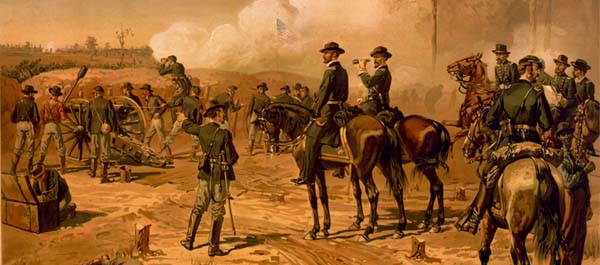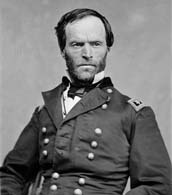Sherman’s Summer Of Insubordination

© Copyright 2010 Carl R. Schenker, Jr.
ACG Editor in Chief’s note: As the uproar over President Obama’s firing of General Stanley McChrystal continues unabated, historian Carl Schenker has plumbed the historical record to tell the story of another American general who was publicly out of step with his president. ACG thanks Schenker for this interesting and very timely article.
June 2010 witnessed the resignation of General Stanley McChrystal as Afghanistan commander after a magazine reported that he had made remarks critical of President Barack Obama (though not his policies) and his national security team. In the summer of 1864, General William Tecumseh Sherman caused similar heartburn for another president from Illinois, Abraham Lincoln, but Sherman lived to fight another day and, supposedly, to have Lincoln praise him for his personal loyalty.
{default} In May 1864, as the Union prepared for presidential elections in November, Sherman began maneuvering the Armies of the Cumberland, Ohio, and Tennessee from Chattanooga, Tennessee, toward Atlanta, Georgia. Major General Sherman was then in command of the vast Military Division of the Mississippi and was second in importance in the Union command structure only to Lt. Gen. Ulysses S. Grant. One of the matters on Sherman’s mind during the Atlanta campaign would be the role that black troops should play in his armies.
In May 1864, as the Union prepared for presidential elections in November, Sherman began maneuvering the Armies of the Cumberland, Ohio, and Tennessee from Chattanooga, Tennessee, toward Atlanta, Georgia. Major General Sherman was then in command of the vast Military Division of the Mississippi and was second in importance in the Union command structure only to Lt. Gen. Ulysses S. Grant. One of the matters on Sherman’s mind during the Atlanta campaign would be the role that black troops should play in his armies.
Sherman had long indicated that he did not want black combat troops. (See the in-depth article by Michael Fellman on this subject at Weider History Group’s historynet.com) In July, Congress passed legislation authorizing the various Union states to “send recruiting agents” into Confederate territory in search of volunteers “who shall be credited to the state … which may procure the enlistment.” Of course, blacks would be prime candidates for such recruitment. Sherman wrote the army’s chief of staff, Henry W. Halleck, that the legislation “is the height of folly.” Lincoln learned of this and, several days later, wrote to Sherman that he had supported the legislation and hoped that it would create “substantial additions to our colored forces, which, unlike white recruits, help us where they come from, as well as where they go to. … May I ask therefore that you will give your hearty co-operation?” Sherman responded that he would respect the law, whatever he thought of it, and would write further on the subject after “I have taken Atlanta and can sit down in some peace.”
Nine days later (July 30), in response to an inquiry from a recruiting agent for Massachusetts, Sherman offered “a pass through our lines” and several constructive suggestions. However, he added that he “doubt[ed]” the wisdom of Congress “in the passage of this Law,” that the “negro … is not the equal of the white man,” and (implicitly) that he was “opposed to the organization of Colored Regiments.” Thus, even after Lincoln had personally asked the general for hearty cooperation in promoting black enlistments, Sherman made it plain that he was out of step with the president and Congress on the subject. Sherman’s letter soon appeared in the press (in the New York Times on August 16), thus making the general’s insubordinate attitudes public. (The Times actually editorialized rather favorably on Sherman’s letter, seconding his view that manpower should instead be sought in the Northern states.)
Meanwhile, the August issue of United States Service Magazine carried a detailed profile of Sherman, written by a friend and former military subordinate. The profile reported that, before Fort Sumter but after many acts of secession throughout the South, Sherman, a West Pointer then in civilian life, had visited Lincoln in the White House (during inauguration week in March 1861). The future general, reported the magazine profile, had come away from the White House convinced that Lincoln did not take the threat of secession seriously enough. Supposedly, Lincoln had “jocularly” said “‘We shall not need many men like you; the whole affair will soon blow over.’” Sherman had probably voiced these criticisms (akin to one of McChrystal’s about Obama) to the author of the profile in 1862, after returning to the army. The Times republished this part of the Sherman profile on August 13, 1864.
Thus, at almost the same time that Sherman’s recalcitrance about black troops became public, the electorate also learned that the general had been critical of Lincoln’s 1861 leadership. One may question whether any of Sherman’s utterances would have justified a court martial under the provision in the Articles of War forbidding officers from “us[ing] contemptuous or disrespectful words” against the president or Congress. At bottom, however, Sherman seems to have given at least as much cause for offense as General McChrystal later would. While serving, Sherman had criticized the commander in chief’s preparedness (and “jocular” demeanor) during the 1861 secession crisis, as McChrystal later questioned Obama’s engagement. Sherman then went further than McChrystal would, publicly questioning the wisdom of Congress, and knowingly undercutting presidential policy, on a matter of substance, black recruitment.
Making things worse, this all unfolded at a time when Lincoln was very discouraged about his chances for reelection, writing on August 23, “it seems exceedingly probable that this Administration will not be re-elected.” Grant’s operations in Virginia had stalled outside Richmond and Petersburg (with black troops slaughtered in the battle of the Crater on July 30), and Sherman’s Georgia campaign had stalled outside Atlanta (with Army of the Tennessee commander James B. McPherson killed on July 22). Now, news accounts about Lincoln’s second most important general had added insult to the injury of Sherman’s thus-far incomplete performance in the field. But a much different fate awaited Sherman than that later befalling General McChrystal.
 Lincoln apparently took no steps to discipline Sherman, not even sending word to stop making troublesome news. At least in theory, discipline was not out of the question, for Sherman was not then the colossal figure that he would soon become. Although there was promise evident in Sherman’s campaign, the commander had not yet achieved decisive results, having only succeeded in outmaneuvering Joe Johnston in northern Georgia, besting John Bell Hood outside Atlanta, and then settling in for weeks of siege warfare. Further, a capable replacement was on hand at Atlanta, in the person of the well-respected Maj. Gen. George H. Thomas, commander of the Army of the Cumberland and Sherman’s senior subordinate.
Lincoln apparently took no steps to discipline Sherman, not even sending word to stop making troublesome news. At least in theory, discipline was not out of the question, for Sherman was not then the colossal figure that he would soon become. Although there was promise evident in Sherman’s campaign, the commander had not yet achieved decisive results, having only succeeded in outmaneuvering Joe Johnston in northern Georgia, besting John Bell Hood outside Atlanta, and then settling in for weeks of siege warfare. Further, a capable replacement was on hand at Atlanta, in the person of the well-respected Maj. Gen. George H. Thomas, commander of the Army of the Cumberland and Sherman’s senior subordinate.
However, Lincoln probably never gave serious thought to disciplining Sherman. The president had many vexatious generals and had already shown himself a patient and forgiving commander in chief. Further, unlike President Obama, Lincoln was not operating within the echo chamber created by today’s 24-hour news cycle. Thus, offenses at least comparable to McChrystal’s doubtless did not loom as large in Lincoln’s mind or that of the public. In addition, Sherman’s operations offered a real prospect of near-term military success, and continuity of command thus recommended itself strongly. Moreover, Sherman had significant political connections and warm support in the army, and dismissing him surely would have had far more cost than would ignoring the USSM profile and tolerating his free-lancing on black recruitment. This was particularly true because Sherman’s racial views were hardly unique.
In short order, Sherman’s summer of insubordination culminated in a blaze of glory, and things looked entirely different only ten days after Lincoln authored his gloomy analysis about reelection. On September 1, the Confederates abandoned Atlanta. Union forces entered the city the next day, and Sherman soon dispatched his famous report to Washington: “Atlanta is ours, and fairly won.” Jubilation swept the North, and Lincoln won reelection easily in November. General Sherman then marched to the sea, presented Savannah to Lincoln as a Christmas present, and in February 1865 began marching northward through the Carolinas. (See “Sherman’s War,” Battlefield Leader, July 2008 ACG.) At Savannah, Sherman finally received some pushback on racial issues in letters from General Halleck and the secretary of the treasury and a visit from the secretary of war, Edwin M. Stanton. Overall, however, the general was so lionized in the North that he even had to fend off efforts to give him rank equal to (or possibly superior to) his friend Grant.
In late March 1865, by happy accident, Lincoln and Sherman came together near the Union front lines in Virginia, at Grant’s headquarters at City Point. According to Sherman’s contemporaneous report, Lincoln was “lavish in his good wishes.” In 1887, however, Sherman went further in commenting on Lincoln, stating that the president asked him whether he knew why “I took a shine to Grant and you.” Sherman said he did not. “[Because] you have never found fault with me.”
We cannot know whether Lincoln really said this to Sherman. If so, he was plainly in error or perhaps speaking with tongue in cheek. Sherman found plenty of fault with Lincoln, from the earliest days of the war onward, but their mutually reinforcing success had now linked them in harmony. And Lincoln’s death in April ensured that Sherman had no further occasion to find fault with the martyred president. Indeed, Sherman would invoke Lincoln’s supposed guidance at City Point to justify the controversial surrender terms he offered to Joe Johnston in the wake of Lincoln’s assassination, subject to approval that was hotly refused in Washington by new president Andrew Johnson and his cabinet.
© Copyright 2010 Carl R. Schenker, Jr.


For those interested in “Sherman’s Summer of Insubordination,” I want to add two notes.
(1) Sherman’s 1864 importance to the war effort is underscored by the fact that, on August 12, he was appointed to one of the closely husbanded major general slots in the regular army. This was before either of the New York Times reports discussed in the article, but the administration nonetheless may have taken the step after learning of the USSM profile and/or the July 20 letter to the recruiting agent. On the other hand, it is at least possible that the administration would have withheld this appointment (thus leaving Sherman as a major general of volunteers) had it known in time of the profile and the letter to the recruiting agent. (In his memoirs, Sherman wrote that he would have preferred that the MG/USA rank be withheld until he had taken Atlanta.)
(2) The author of the USSM profile, which appeared in the August 1864 issue, was Col. Samuel M. Bowman, then involved with colored troops in Maryland. Presumably by coincidence, Lincoln summoned Bowman to the White House in an August 6, 1864 directive. CWAL, VII: 482. One wonders whether Bowman and Lincoln might have discussed Sherman during their meeting.